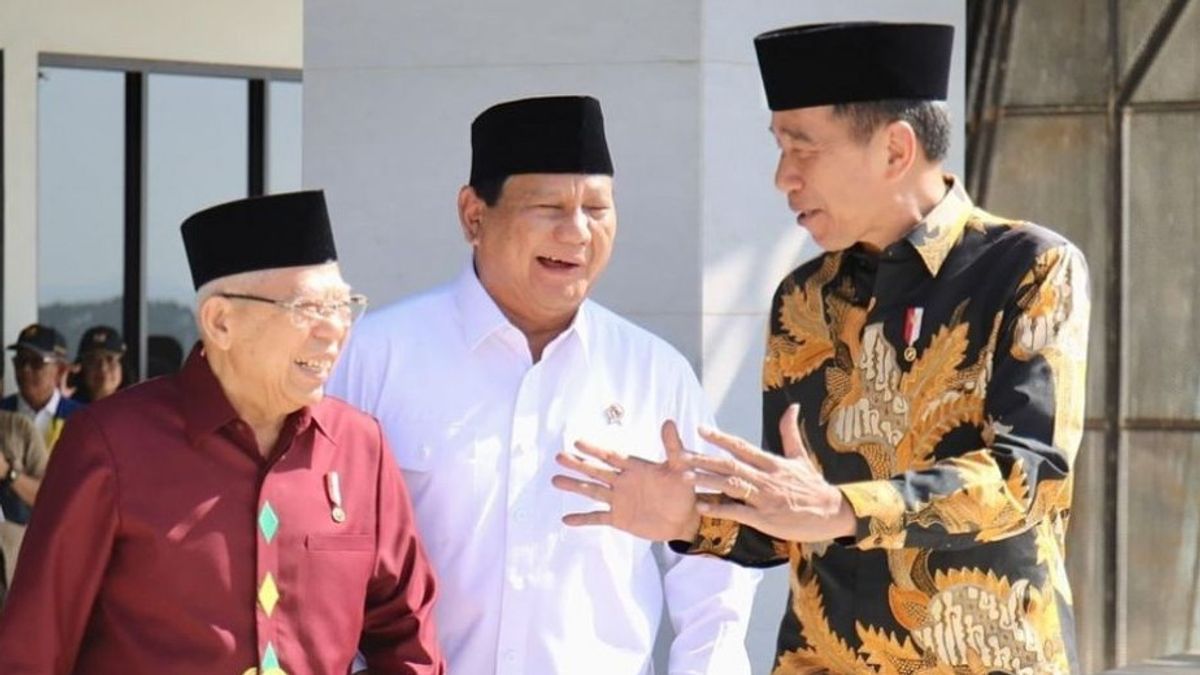JAKARTA The DPR's decision to ratify the Draft Law (RUU) on Amendments to Law Number 39 of 2008 concerning the Ministry of State has been responded to cynically by various groups. This ratification is suspected to be the next loophole to divide power due to the fat coalition.
The seventh plenary session of the DPR During the First Session of the 2024-2025 Session Year at the Parliament Complex, Jakarta, Thursday (19/9/2024) succeeded in passing the State Ministry Law. The process of ratifying this uu is fairly smooth and will run in a short time. Around a week earlier, the Legislation Body (Baleg) of the DPR and the government completed discussions on the revision of the State Ministry's Law in less than eight hours and agreed to take it to a plenary meeting.
As soon as the revision of the State Ministry Law was brought to light, the public immediately accused Prabowo Subianto's elected president of cattle trade politics. Not without reason this accusation emerged. In addition to the process of the law which went very smoothly, articles that changed, were added, or removed specifically related to the ministry's preparation process.
There are at least six important points in the change, one of which is regarding the number of ministries that are now set according to the needs of the president.
President and vice president elected for the 2024-2029 period Prabowo Subianto-Gibran Rakabuming Raka was promoted by a major coalition in the presidential election which was held on February 14. There are four parliamentary political parties, namely the Gerindra Party, Golkar, PAN, and Democrats who support this duet. In addition, there are still four non-parlement parties, namely the United Nations, the Gelora Indonesia Party, PSI, the Garuda Party, one local party, namely the Aceh Party. The combination of political parties that support Prabowo-Gibran is then referred to as the Coalition of Advanced Indonesia or KIM.
Shortly after being officially declared the winner of the election, rumors that Prabowo Subianto would increase the number of ministries after being sworn in as president became a hot public conversation.
At that time the discourse that developed was Prabowo would increase the number of ministries from 34 to 41. According to the deputy chairman of the Gerindra Party, Habiburokhman, this idea is a natural thing considering that Indonesia is a big country and needs a lot of people in the government to take care of it. Later, the number of ministries after Prabowo was sworn in as president on October 20 reached 44.
One of the ministries-level agencies that will be formed later is the State Revenue Agency (BPN). The plan for the establishment of this BPN has been echoed since the last presidential election campaign period. This agency is expected to boost state tax and non-tax revenues.
Meanwhile, President Joko Widodo has formed two new bodies at the ministry level, namely the Presidential Communication Office and the National Nutrition Agency. The National Nutrition Agency will execute a free nutritious eating program that will start running for years with an allocation of funds of around Rp71 trillion.
Rumors about the increase in ministries have been responded to by many people. The formation of a jumbo cabinet is not solely to take care of Indonesia, as stated by Habiburokhman, but to accommodate them, both political parties and volunteers, who have supported the Prabowo-Gibran pair throughout the presidential election. Moreover, recently other parties that had previously been opposite became closer to Prabowo.
Political observer Ujang Komarudin sees the addition of ministries in Prabowo's cabinet as a big consequence of the coalition in the 2024 presidential election. It is common knowledge that the supporting parties and supporters will definitely want to get the position.
"There is an agreement to tie the promise of a five-year coalition, yes, the consequence is to give positions to coalition parties. And that is a general construction in political practice," said Ujang.
In the context of Indonesian politics, this is reasonable. "What is called a political party, if you form a coalition, you definitely want to get a ministerial seat," explained the University of Indonesia lecturer. Most importantly, Ujang added, Prabowo did not just appoint who the figures would help him later, namely figures who have capacity, capability, and integrity.
Meanwhile, the Executive Director of Indonesia Political Opinion (IPO), Dedi Kurnia Syah, assessed that adding a ministry post was a wrong step. He said the elected president should have added official offices, not even adding ministries.
SEE ALSO:
"Understanding Indonesia's character, in terms of the state system, community culture and geography, Indonesia does not require many ministries or positions at the central level. Instead, what needs to be added is the office office at the provincial level," said Dedi.
According to Dedi, the ministry as an administrative region only needs to oversee the regulations and implementation that are charged with official service in the region. He views that the current ministries are dominated by the work-employment of the organizer. This is an alarming fact and has the potential to have no major impact on society.
Instead of adding, Dedi actually sees that the current ministry in the era of President Jokowi should be trimmed and merged into ministries whose working properties are almost the same so that overlapping does not occur.
"The ministry in Indonesia should be moratorized, even reduced. For example, the Cabinet Secretariat is merged with the State Secretariat, the Ministry of Social Affairs is merged with Manpower. The Coordinating Ministry for Human Development and Culture is removed, the Ministry of Transportation is merged with PUPR, and others," said Dedi.
Dedi did not deny the possibility of a negative impact from adding a ministry post, which he said had started in the era of President Jokowi. One of the concerns is to trigger zero supervision in parliament in the future.
"The DPR has so far been dominated by power support and strong agreement nuances to open up opportunities for many ministries in the future. Of course this has a bad impact, apart from burdening the state budget, it can also hamper the pace of performance," said Dedi.
The English, Chinese, Japanese, Arabic, and French versions are automatically generated by the AI. So there may still be inaccuracies in translating, please always see Indonesian as our main language. (system supported by DigitalSiber.id)
















